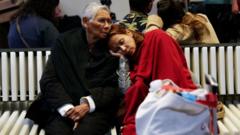The incident has ignited a national dialogue on the treatment of violence against Muslims and government accountability.
**Tragic Killing of Muslim Worshiper Sparks Controversy Over Government Response in France**

**Tragic Killing of Muslim Worshiper Sparks Controversy Over Government Response in France**
The fatal stabbing of Aboubakar Cissé in a mosque raises questions about bias crime designations.
In a chilling incident on April 27, 2025, a 21-year-old Muslim worshiper, Aboubakar Cissé, was brutally stabbed multiple times while praying in a mosque situated in La Grand-Combe, a town in southern France. This violent act has raised a storm of criticism directed at government officials for their initial failure to classify the attack as a potential hate crime.
Cissé, originally from Mali, was killed in what appears to be a targeted act of violence. The primary suspect, a Bosnian-born French national, filmed himself standing over Cissé's body, reportedly making offensive remarks about Allah that he later shared on Snapchat. Initially, local prosecutor Abdelkrim Grini mischaracterized the attack as stemming from a personal dispute among worshipers. However, this assessment changed within 48 hours as the investigation evolved; Grini publicly acknowledged that the killing is now being scrutinized as potentially reflecting anti-Muslim motives, or "Islamophobic connotations." He also indicated that other possible motives were being explored, citing the suspect's possible fascination with death and notoriety.
The suspect fled to Italy after the crime but subsequently surrendered to authorities in Pistoia. He is currently in Italian custody, and formal extradition to France could delay the legal process for some time. As of now, he has not faced any formal charges, and further details regarding his background remain undisclosed.
The slow response of officials in labeling this attack as a hate crime has provoked significant outrage among community leaders and many in the public sphere. Critics allege that this hesitance underscores a broader pattern of systemic issues regarding the treatment of violence against Muslims in France. Many believe that the swift categorization of hate crimes in other scenarios reveals an inconsistency that warrants serious investigation into the French government's approach toward religious minorities.
As communities rally in memory of Cissé, the incident remains a crucial point of discussion regarding national identity and the responsibility of state officials to act decisively in the face of ethnic and religious violence. The growing public pressure suggests that this tragic event may serve as a pivotal moment in reexamining France's policies and attitudes toward its Muslim citizens.
Cissé, originally from Mali, was killed in what appears to be a targeted act of violence. The primary suspect, a Bosnian-born French national, filmed himself standing over Cissé's body, reportedly making offensive remarks about Allah that he later shared on Snapchat. Initially, local prosecutor Abdelkrim Grini mischaracterized the attack as stemming from a personal dispute among worshipers. However, this assessment changed within 48 hours as the investigation evolved; Grini publicly acknowledged that the killing is now being scrutinized as potentially reflecting anti-Muslim motives, or "Islamophobic connotations." He also indicated that other possible motives were being explored, citing the suspect's possible fascination with death and notoriety.
The suspect fled to Italy after the crime but subsequently surrendered to authorities in Pistoia. He is currently in Italian custody, and formal extradition to France could delay the legal process for some time. As of now, he has not faced any formal charges, and further details regarding his background remain undisclosed.
The slow response of officials in labeling this attack as a hate crime has provoked significant outrage among community leaders and many in the public sphere. Critics allege that this hesitance underscores a broader pattern of systemic issues regarding the treatment of violence against Muslims in France. Many believe that the swift categorization of hate crimes in other scenarios reveals an inconsistency that warrants serious investigation into the French government's approach toward religious minorities.
As communities rally in memory of Cissé, the incident remains a crucial point of discussion regarding national identity and the responsibility of state officials to act decisively in the face of ethnic and religious violence. The growing public pressure suggests that this tragic event may serve as a pivotal moment in reexamining France's policies and attitudes toward its Muslim citizens.




















